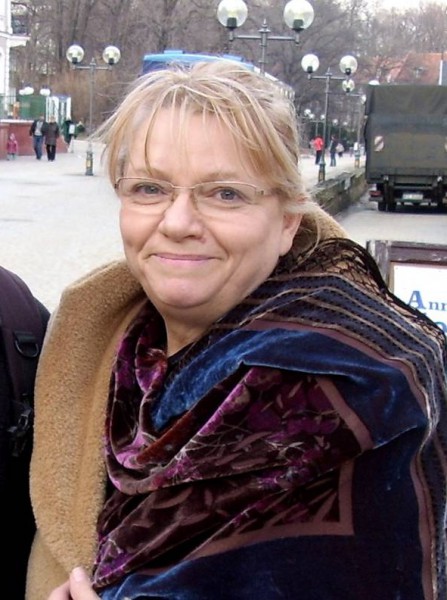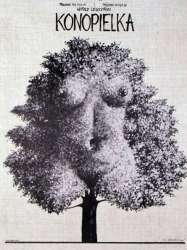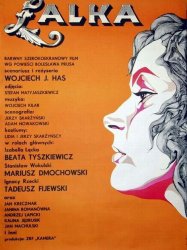Anna Seniuk is a Actor Polonaise born on 17 november 1942 at Ivano-Frankivsk (Ukraine)

Anna Seniuk (born 17 November 1942 in Stanislaviv) is a Polish actress.
After World War II, together with other Poles from Stanisławów, she was forced by the Soviet government to leave her hometown, settling in the town of Zator, near Oświęcim. In 1964 Seniuk graduated from Państwowa Wyższa Szkoła Teatralna (Academy for the Dramatic Arts) in Kraków and debuted in the renowned Helena Modrzejewska (Old Theatre). In the early 1970s, she moved to Warsaw, where she played in several theatres. Since 2003, she has been working there at the National Theatre.
Seniuk is known to Polish viewers mainly for her role of Magda Karwowska in the immensely popular 1970s Polish TV series Czterdziestolatek (The Forty-Year-Old). She has cooperated with Polish Radio and has been featured in more than 40 radio shows. Among her most famous film roles, there are appearances in such productions as Europa Europa, Potop and The Maids of Wilko.
Source : Wikidata
Anna Seniuk

- Infos
- Photos
- Best films
- Family
- Characters
- Awards
Birth name Anna Seniuk
Nationality Pologne
Birth 17 november 1942 (82 years) at Ivano-Frankivsk (Ukraine)
Awards Medal for Merit to Culture, Knight of the Order of Polonia Restituta
Nationality Pologne
Birth 17 november 1942 (82 years) at Ivano-Frankivsk (Ukraine)
Awards Medal for Merit to Culture, Knight of the Order of Polonia Restituta
After World War II, together with other Poles from Stanisławów, she was forced by the Soviet government to leave her hometown, settling in the town of Zator, near Oświęcim. In 1964 Seniuk graduated from Państwowa Wyższa Szkoła Teatralna (Academy for the Dramatic Arts) in Kraków and debuted in the renowned Helena Modrzejewska (Old Theatre). In the early 1970s, she moved to Warsaw, where she played in several theatres. Since 2003, she has been working there at the National Theatre.
Seniuk is known to Polish viewers mainly for her role of Magda Karwowska in the immensely popular 1970s Polish TV series Czterdziestolatek (The Forty-Year-Old). She has cooperated with Polish Radio and has been featured in more than 40 radio shows. Among her most famous film roles, there are appearances in such productions as Europa Europa, Potop and The Maids of Wilko.
Usually with
Filmography of Anna Seniuk (9 films)
Actress
 , 1h15
, 1h15Directed by Adam Guziński
Genres Drama
Actors Piotr Bajor, Anna Seniuk
Roles Nurse Basia
Rating62%






Europa Europa (1990)
, 1h52Directed by Agnieszka Holland
Origin German
Genres Drama, War, Historical
Themes Politique, Films about religion, Films about sexuality, LGBT-related films, Political films, Films about Jews and Judaism, LGBT-related films, LGBT-related film
Actors Marco Hofschneider, Julie Delpy, André Wilms, Artur Barciś, Michèle Gleizer, Nathalie Schmidt
Roles Rosemarie / Nazi Activist
Rating74%





Solek (a nickname for Solomon, also called "Solly") and his family live in Nazi Germany. On the eve of Solek's bar mitzvah, Kristallnacht occurs. He escapes, naked, then hiding in a barrel. At night, he calls his acquaintance to bring him clothes from his house. She refuses, but throws him a leather jacket with a swastika band on its arm. He comes back home. His family is together at home, but his sister is killed by Nazis. The father, who was born in Łódź, Poland, decides to go back there.

The Linnet (1982)
, 1h32Directed by Witold Leszczyński
Genres Drama, Comedy
Actors Krzysztof Majchrzak, Anna Seniuk, Franciszek Pieczka, Arkadiusz Bazak, Sylwester Maciejewski
Roles Handzia
Rating74%





Kaziuk, un paysan têtu, et sa femme enceinte vivent dans un village reculé de Pologne, épargné par la civilisation. Mais un fonctionnaire vient annoncer l'arrivée prochaine de l'électricité et qu'une nouvelle institutrice enseignera bientôt dans l'école du village. Une fois installée, celle-ci attise les fantasmes de Kaziuk qui, frustré, commet un acte sacrilège ...

Tender Spots (1981)
, 1h29Directed by Piotr Andrejew
Origin Pologne
Genres Drama, Science fiction, Social science fiction
Actors Mariusz Dmochowski, Anna Nehrebecka, Włodzimierz Boruński, Ernestyna Winnicka, Ewa Ziętek, Liliana Komorowska
Roles Barmanka
Rating60%





Nous sommes en 1998 et le monde se trouve dans un cataclysme écologique : il y a une pénurie d'eau, l'environnement est pollué et être dehors comporte des risques élevés. Le personnage principal est un technicien de télévision, Jan, un individualiste, harcelé par les conformistes. Jan aime Ewa, une étudiante en ballet, qui à son tour est en liaison avec Allan, un homme puissant et prospère.

Father of the Queen (1980)
Genres Comedy, Adventure
Actors Anna Seniuk, Emil Karewicz, Mariusz Dmochowski, Jan Englert, Ludwik Benoit, Wieńczysław Gliński
Roles Maria Kazimiera
Rating59%






The Moth (1980)
, 1h40Directed by Tomasz Zygadło
Genres Drama
Actors Anna Seniuk, Jerzy Trela, Piotr Fronczewski, Jerzy Stuhr
Roles Magda, Jan's mistress
Rating69%






The Maids of Wilko (1979)
, 1h58Directed by Andrzej Wajda
Origin Pologne
Genres Drama, Romance
Actors Daniel Olbrychski, Anna Seniuk, Maja Komorowska, Stanisława Celińska, Krystyna Zachwatowicz-Wajda, Christine Pascal
Roles Julcia
Rating73%





At the age of 40, Wiktor Ruben (Daniel Olbrychski) returns to the family property (Wilko) where he'd spent his late teens/early twenties as a tutor of young sisters. Now they are all women - mostly wives and mothers. Wiktor discovers that Fela, once the closest to him, is now dead for some time and other sisters aren't too keen to talk about her and her grave is rather forgotten. He is also disappointed with how all the women have changed. Julia (Anna Seniuk), now a mother of two, doesn't resemble his first object of love and desire she once was and doesn't show him an affection he might expected. Jola (Maja Komorowska), seemingly unhappy in her marriage, chases him and makes fun of it, until he doesn't bring the painful memories of the past. Kazia (Krystyna Zachwatowicz), a divorcee - thus treated like less worthy than others - is the most demanding partner of his intellectual reflections while Zosia (Stanisława Celińska) is - as always - distant and outspoken. That leaves him with Tunia (Christine Pascal) who was only a child when he previously knew her but now resembles Fela. Wiktor spends time in Wilko but isn't able to see that his return restored once forgotten dreams and hopes of the sisters.

The Deluge (1974)
, 5h15Directed by Jerzy Hoffman
Origin Pologne
Genres War, Adventure, Historical, Romance
Actors Daniel Olbrychski, Małgorzata Braunek, Tadeusz Łomnicki, Krzysztof Kowalewski, Kazimierz Wichniarz, Władysław Hańcza
Roles Marynia Gasztowtówna-Paculanka
Rating76%





The film is set in the 17th century during the Swedish invasion of the Polish-Lithuanian Commonwealth in the years 1655 to 1658, known as The Deluge, which was eventually thwarted by the Polish-Lithuanian forces. However, a quarter of the Polish-Lithuanian population died through war and plague, and the country's economy was devastated.

The Doll (1968)
, 2h19Directed by Wojciech Has
Origin Pologne
Genres Drama, Historical, Romance
Actors Beata Tyszkiewicz, Mariusz Dmochowski, Tadeusz Fijewski, Wiesław Gołas, Jan Machulski, Kalina Jędrusik
Roles Magdalenka
Rating68%





As a descendant of an impoverished Polish noble family, young Wokulski is forced to work as a waiter at Hopfer's, a Warsaw restaurant, while dreaming of a life in science. After taking part in the failed 1863 Uprising against Tsarist Russia, he is sentenced to exile in Siberia. On eventual return to Warsaw, he becomes a salesman at Mincel's haberdashery. Marrying the late owner's widow (who eventually dies), he comes into money and uses it to set up a partnership with a Russian merchant he had met while in exile. The two merchants go to Bulgaria during the Russo-Turkish War, and Wokulski makes a fortune supplying the Russian Army. The enterprising Wokulski now proves a romantic at heart, falling in love with Izabela, daughter of the vacuous, bankrupt aristocrat, Tomasz Łęcki. In his quest to win Izabela, Wokulski begins frequenting theatres and aristocratic salons; and to help her financially distressed father, founds a company and sets the aristocrats up as shareholders in his business. The indolence of these aristocrats, who secure with their pensions, are too lazy to undertake new business risks, frustrates Wokulski. His ability to make money is respected but his lack of family and social rank is condescended to. Because of his "help" (in secret) to Izabela's impecunious but influential father, the girl becomes aware of his affection. In the end she consents to accept him, but without true devotion or love.
 Connection
Connection



